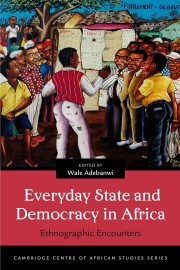Fragile Relationships: Elusive encounters with public health care in rural Burkina Faso
 Associate Professor Helle Samuelsen has contributed the chapter ‘Fragile Relationships: Elusive encounters with public health care in rural Burkina Faso’ in a new publication ‘Everyday State and Democracy in Africa’. Edited by Wale Adebanwi, the book examines contemporary citizens’ everyday encounters with the state and democratic processes in Africa.
Associate Professor Helle Samuelsen has contributed the chapter ‘Fragile Relationships: Elusive encounters with public health care in rural Burkina Faso’ in a new publication ‘Everyday State and Democracy in Africa’. Edited by Wale Adebanwi, the book examines contemporary citizens’ everyday encounters with the state and democratic processes in Africa.
In her chapter, Helle Samuelsen investigates the security situation in the West African region with focus on Burkina Faso, which is subject to international concern, as it appears increasingly fragile.
Burkina Faso was for decades highlighted as a peaceful country without any major conflicts despite great ethnic and religious diversity. In recent years, the situation has changed dramatically. Violent incidents and terrorist attacks have shattered the political stability in Burkina Faso, and a popular uprising in 2016 against the incumbent president for 27 years has not stabilised the situation.
These conflicts coupled with high levels of rural poverty create a delicate situation. Drawing on more than twenty years of engagement with Burkina Faso, Samuelsen’s chapter explores the critical relationship between rural citizens and the state from ‘below’ taking the point of departure in the everyday formal and informal experiences of ordinary people with the state and its local representatives.
With a particular focus on the often shambolic relationship between the rural citizens and the public health care system and other locally based government representatives, she discusses what consequences the ‘absent-present’ state have for the everyday life of rural citizens, as well as how it affects the rural citizens trust in the democratic state.
Read more about the book and the editor’s preface: Everyday State and Democracy in Africa. Ethnographic Encounters
